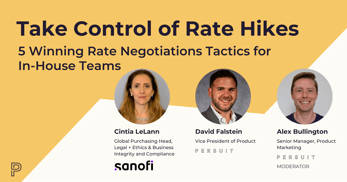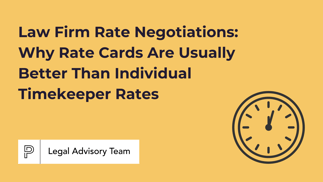Value-based pricing is a pricing model that incentivizes value and results rather than the time spent to accomplish those services. Within legal, value-based billing is categorized as a type of alternative fee arrangement, typically using some form of fixed-fee or fee-for-results billing agreement.
Value billing has been around for decades, but it has been growing in popularity in recent years. Glaxo-Smith-Kline (GSK), for example, was one of the first major companies to implement an AFA program that relied heavily on value-based pricing, a program that was profiled in 2013 in a Harvard Business Review case study. On the firm side, Wachtell Lipton Rosen & Katz Wactell is regularly rated as one of the most profitable firms in the world — and bills its services almost exclusively using value-based pricing.
Value-based pricing is a type of AFA, but not all AFAs are value-based
Value-based pricing is actually a subset of AFAs, and not all AFAs are based solely on the value being delivered. Consider these two popular AFA types:
- Capped fees
- Collared fees
Both capped fees and collared fees continue to connect the fee being charged with the hours spent on the matter. The only difference is that there’s a limit to the amount of hours a firm can bill.
Because capped and collared fees maintain the link between hours and fees collected, we rarely recommend them when working with in-house teams. In practice, our experience has been that firms will simply bill as many hours as allowed under the cap or the collar anyway. The same is true of shadow billing, which maintains the link between hours and value even when using a fixed-fee or value-based arrangement.
AFA types for value-based pricing
Unlike capped or collared fees, the following AFA types realign the incentives at work between in-house teams and their clients, focusing on value and results rather than time worked.
These are the AFA types we most often recommend when working with in-house legal teams.
1. Fixed fee pricing
- Portfolio fixed fee
- Matter-level fixed fee
- Phase-level fixed fee
- Task-based/Line-item fixed fee
- Activity-collared fixed fee
2. Value-based pricing
- Value-adjusted billing
- Success fee
- Contingency fee
- Hybrid
Why are more in-house teams using value-based pricing?
1. To realign incentives for law firms
Value-based pricing incentives law firms to focus on the value they deliver and outcomes they create — the deliverables that are truly meaningful to their clients.
That’s a major change from traditional billable hours, where law firms have a financial incentive to spend more time on a matter — rather than deliver a result or an outcome in the most efficiency way possible.
2. To better predict costs for budget planning
It’s often very difficult to know how much a matter will cost under traditional billable hours. That makes it very challenging to create a budget or justify spending at the end of a quarter or a fiscal year.
Value-based pricing often relies on fixed fee agreements (either phased or at the matter level) that are much easier to predict — creating much greater predictability for budget planning.
3. To discover the “true market price” for legal services
Legal pricing can feel vague or arbitrary. When relying on billable hours, law firms often set their prices adding percentage increase to the rates they charged previously — plus a percentage increase above their previous rates.
When combined with a transparent, competitive selection process, value-based pricing creates creates a market that will show you what a service should be worth — a “true market price” — rather than simply multiplying time worked against an hourly rate.
Why value-based pricing instead of hourly billing?
Hourly billing, while comfortable and easy to implement, causes a variety of challenges:
1. Hourly billing has no incentive for firms to be efficient
Under billable hours, greater efficiency = fewer billable hours and lower revenue for the firm, meaning hourly billing actually punishes firms that innovate to find better, faster, more efficient ways of doing things.
Value-based pricing puts the focus on the result a firm can deliver, not the number of hours it takes to deliver that result. For that reason, value-based pricing incentivizes creativity, innovation, and resourcefulness by firms.
2. Hourly billing can create surprise costs for clients
Even if you have a discount from your law firm, it’s usually very difficult to know ahead of time how much time they’ll spend on your matters. We’ve heard many stories of invoices that come in far above what the in-house team had budgeted for the quarter or the year — sometimes millions of dollars more.
Value-based pricing gives you a much stronger idea of what a matter will cost overall and eliminates surprise costs from firms spending more time on a matter than you expected.
3. Hourly billing limits the profit potential for law firms
It may seem counterintuitive, but hourly billing actually caps the profit potential for law firms — restricting them to the number of hours their partners and staff can bill in a given time period.
The natural limit of the number of hours in the day is the reason firms continue to increase their hourly rates year after year, with no end in sight. If hourly billing is a firm’s primary business model, raising rates is one of the only options it has to increase profit compared to the previous year. They could also bill more hours, but that’s not always possible; many firms are already asking their teams to work extremely long.
Value-based pricing puts the incentive on results and outcomes, not the time spent on a matter. If a firm is able to improve efficiency or innovate how it delivers results, it opens a completely new way to increase profits beyond working longer hours or raising hourly rates.
4. Hourly billing creates more administrative burden
Many in-house teams spend hundreds or thousands of hours across their departments manually reviewing invoices from their law firms, checking them line-by-line, ensuring each timekeeper has been billed correctly.
Value-based pricing can relieve in-house teams of much of this burden. The monthly invoices with hundreds of line items your team must review can often be replaced by three or four line invoices billed at predetermined rates and milestones.
.png)
%20(7).png?width=1920&height=1080&name=5%20Data%20Benchmarks%20To%20Use%20When%20Firms%20Ask%20(1920%20%C3%97%201080%20px)%20(7).png)

.png?width=2000&height=1125&name=PERSUIT%205%20Myths_V2%20(2).png)




